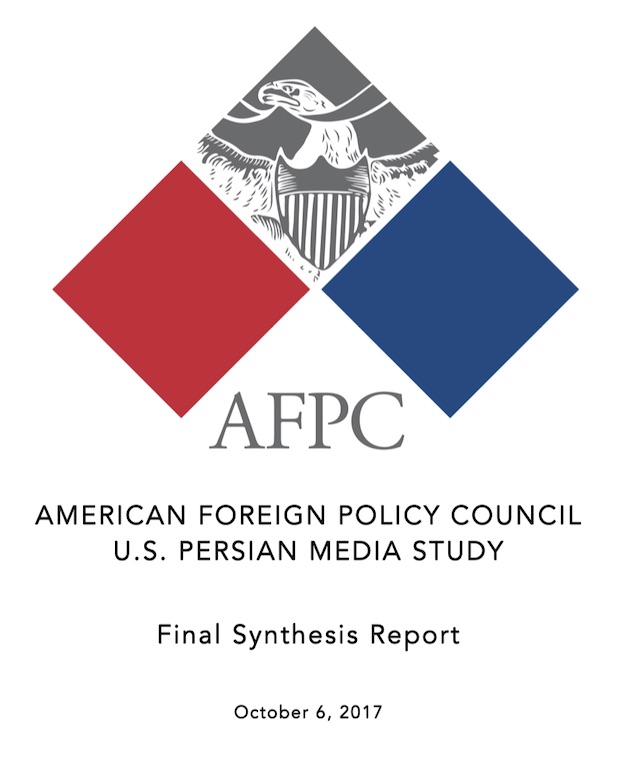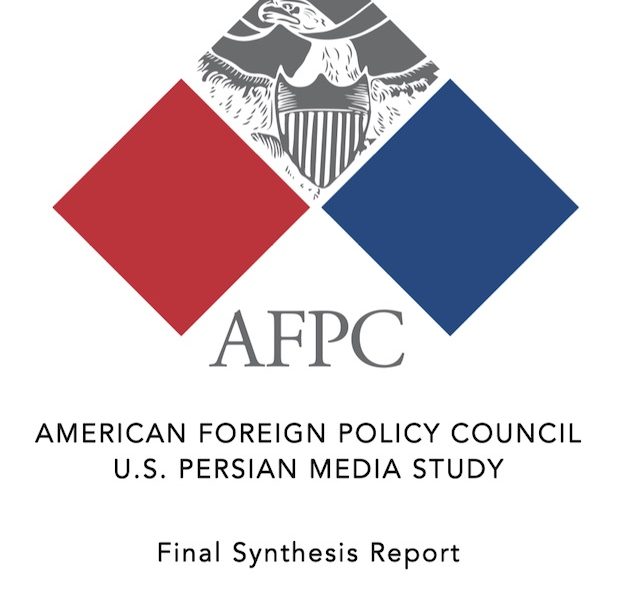
On October 6, 2017, the American Foreign Policy Council (AFPC) released a highly critical study of the Voice of America (VOA) Persian Service’s broadcasting to Iran. The study was less critical of the Radio Free Europe/Radio Liberty’s (RFE/RL) Radio Farda programming to Iran. Still, it also found some problems with Radio Farda’s broadcasts.
The American Foreign Policy Council (AFPC) was commissioned by the U.S. Broadcasting Board of Governors (BBG) to carry out an independent third-party review of programming on the Voice of America’s Persian Service and Radio Free Europe/Radio Liberty’s (RFE/RL) Radio Farda. The objective of the study was to examine relevant content for accuracy of reporting, institutional bias, and major flaws, with the goal of providing the BBG with an assessment of contemporary U.S. international broadcasting into Iran. In 2018, the Broadcasting Board of Governors was renamed the U.S. Agency for Global Media (USAGM).
Coverage of Iranian foreign policy on both the VOA and Farda was found to be rather problematic, owing to a pervasive lack of context. In the media segments reviewed by the panelists, there were repeated instances of the use of official regime statements as the baseline for stories in a manner that left the Iranian assertions unchallenged. Moreover, instances of problematic Iranian regional behavior (e.g., Iran’s extensive—and deeply harmful—activities in the Syrian theater in support of the Assad regime) were addressed sparsely, if at all. By contrast, both hosts and guests on a number of programs reviewed sought to portray the Islamic Republic as a constructive actor in the region—and a stalwart opponent of the more insidious threat of Sunni extremism. This dynamic, on the whole, perpetuated to audiences the appearance of pro-regime propaganda, rather than objective reporting, on the part of both the VOA and Farda.
Notably, coverage of Iranian internal politics, as well as human rights conditions and societal trends within the Islamic Republic, was found to be markedly more robust on Radio Farda than on VOA. This represents a comparative bright spot in the BBG’s overall broadcasting toward Iran.
The media clips examined as part of this study consistently suffered from a lack of substantive discussion regarding the institutions, procedures and workings of the U.S. government. Given the location of the Voice of America in Washington, DC, this represents an enormous missed opportunity to educate the Iranian public about the U.S. system of government—and about the workings of Congress and agencies within the Executive Branch. This failing is particularly striking because, as at least some of the panelists found, callers to various VOA programs expressed a clear desire to learn more about democratic processes (and to contrast them to Iran’s unrepresentative system of government). More often than not, however, these lines of inquiry were not pursued or were actively discouraged by the program’s hosts.
The coverage reviewed by the panelists generally offered consistent, impartial reportage on the conflict in Syria, as well as of U.S. policy towards it. However, reporting on broader U.S. policy in the region was found to be far more spotty, and included failures to properly contextualize and explain the priorities, considerations and objectives of the new Administration. At the same time, at least some of the guests invited on the air on Voice of America programming espoused deeply negative, even conspiratorial, views of U.S. actions and priorities in the region without being authoritatively rebutted. In the material reviewed, this problem was significantly more pronounced on VOA than on Radio Farda, despite the latter’s geographic location in Prague (rather than Washington, DC).
Because of its prominence in the Washington policy debate and its relevance to the overall state of U.S.-Iranian relations, reporting on the Iran nuclear deal (commonly known as the JCPOA) has been understandably robust on both the VOA and Radio Farda. More broadly, however, coverage of the JCPOA on both the Voice of America and Radio Farda was found to consistently lack broader context. Little to no effort was made, either by hosts or journalists, to explain the limitations of the agreement itself, or the detrimental side effects generated by it, or the implications of the deal for U.S. policy in the broader region.

Final Synthesis Report
October 6, 2017


